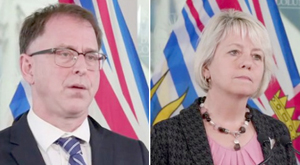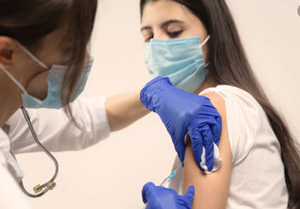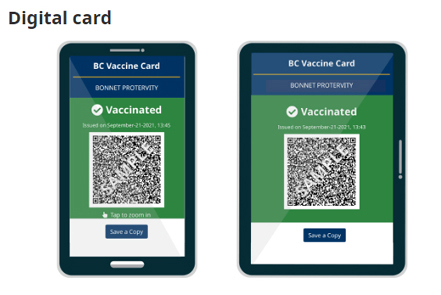
Tuesday October 12, 2021 | VICTORIA, BC [Updated 3:30 pm with October 12, 2021 COVID stats]
Insights by Mary P Brooke, B.Sc., Editor | Island Social Trends
It’s now after the Thanksgiving long weekend, and four days of COVID-19 case stats will be released this afternoon by the BC Centre of Disease Control and Ministry of Health. Last year Thanksgiving brought a spike in cases (after the 10 to 14-day incubation period of the virus); so we’re yet to see the full impact of families and friends having gathered for some relaxing time.
But ahead of today’s coming statistics, at noon, Provincial Health Officer Dr Bonnie Henry and Health Minister Adrian Dix addressed media with a more clarity than usual. Here are some of their quotes:
“It’s going to get harder before it gets easier,” said Dr Henry regarding COVID transmission (due mostly to virulence of Delta variant) as we head into the usual flu and respiratory season of fall and winter.
She added that influenza “spreads easily among young children”. Last year’s 2020 flu season was virtually non-existent, as the public health protocols against COVID (e.g. physical distancing, frequent hand washing, wearing a mask, and staying home if ill) significantly reduced transmission of other respiratory viruses as well.
Ironically, that was still at a time when it was like pulling teeth to get health officials to refer to COVID as an airborne virus (it’s still tough to elicit those particular words from health officials).
Attention youth:
Finally it’s coming out loud and clear — the very thing that common sense made obvious a long time again. To youth in BC, Dr Henry said today re COVID and the Delta variant: “This virus has changed. It’s not the same as last summer. There can be severe illness in younger people without underlying health issues. For young people who thought they could just weather this, get vaccinated.”
The BC public health approach to imploring everyone in BC to protect elders by first keeping their distance and then as the main reason to get vaccinated (with nary a mention of young adults until well into the middle of 2021), was imprinted into the BC Immunization Plan as well.
The age-based immunization rollout saw vaccine administration first to the oldest BC residents (starting with those in long-term care, as well as to people in assisted living) and going down by 5-year cohorts over time. For sure, management of a finite vaccine supply was an issue earlier this year (that’s not the case now, with BC in fact intending to return 300,000 Moderna doses to the federal government this month).

By the time it came for people in their 30s to be offered the COVID vaccine at mass clinics, BC Health opened up vaccination to teens age 12 to 19 who could get a shot without an appointment (including just showing up with their family, or with a group of friends). This not only left people in their 20s and 30s to last in the vaccination queue (adults in their most productive and reproductive years) without protection, it blasted out a message that they matter less. The angst that young adults have been enduring in BC society for years (challenges to employment, education, housing and overall cost of living including child care) was rubbed all that much more raw by the neglect of their age group and generation by the immunization plan.
Perhaps in days of olde it was young people who were sent off to war while older and more frail people stayed home and waited. But in the 21st century the social impacts of that thinking were shockingly absent in this immunization scenario. While fighting the COVID battle can indeed be likened to fighting a war (indeed the COVID virus is like a bullet that will take down any target it can hit), this is not pre-modern times. Societal impacts are as real as financial and physical impacts. The BC government took a while to catch up to that (at least in terms of the COVID file).
Helping business:
There has been an eye to helping business in BC to weather the COVID storm. Where it could, the BC Government has provided funding, leeway and opportunities to business (catching up this year with assistance to tourism in particular). Both employers and self-employed were addressed rather skillfully through various financial support programs.
In the public health context, Dr Henry said the BC Vaccine Card “is not meant to be a permanent thing” but that it was brought in to help business have safe interactions for staff and customers.
The card interface on the BC Government website was available starting September 13. You must be fully vaccinated (two doses) by October 24, 2021 in order to qualify for the BC Vaccine Card (available both digital and on paper). Presently it’s in place to January 31, 2022.
Today Dix said 3,565,665 people have downloaded the BC Vaccine Card, calling it “a very impressive response” & “a real tangible support for the vaccination program”.
COVID stats in BC:
When the four-day COVID case and vaccination stats come later today, we will add them to this article (now added). This table shows a comparison of COVID stats from before the Thanksgiving long weekend and now today after the weekend (though any infections acquired this weekend will take about 7 to 10 days to show up):
| COVID in BC (BC CDC stats) | Fri Oct 8, 2021 | Tues Oct 12, 2021 (4 days later) |
| Total Cases – pandemic to date | 192,491 | 195,581 |
| Active Cases – at this date | 5,969 | 5,183 |
| New Cases – at this date | 743 (in past 24 hrs) | 2,090 (over 4 days) / about 523/day. Daily profile: Oct 8-9: 603 | Oct 9-10: 634 | Oct 10-11: 468 | Oct 11-12: 385 |
| Recovered – pandemic to date | 184,121 (95.6%) | 186,955 (95.6%) |
| Vaccinated – 1 dose (age 12+) | 88.60% | 88.8% |
| Vaccinated – 2 doses (age 12+) | 82.20% | 82.6% |
| Current Hospitalizations / ICU | 360 / 137 | 357 / 153 |
| Total Hospitalizations (to date) | 10,246 | 10,444 |
| Total Deaths (to date) | 2001 | 2029 (+28 in four days) |
| Positivity Rate | 4.8 | 4.5 |
===== RELATED:
Vancouver Island COVID profile on Thanksgiving weekend 2021 (October 11, 2021)
Island Social Trends COVID ARCHIVE (pandemic to date)





